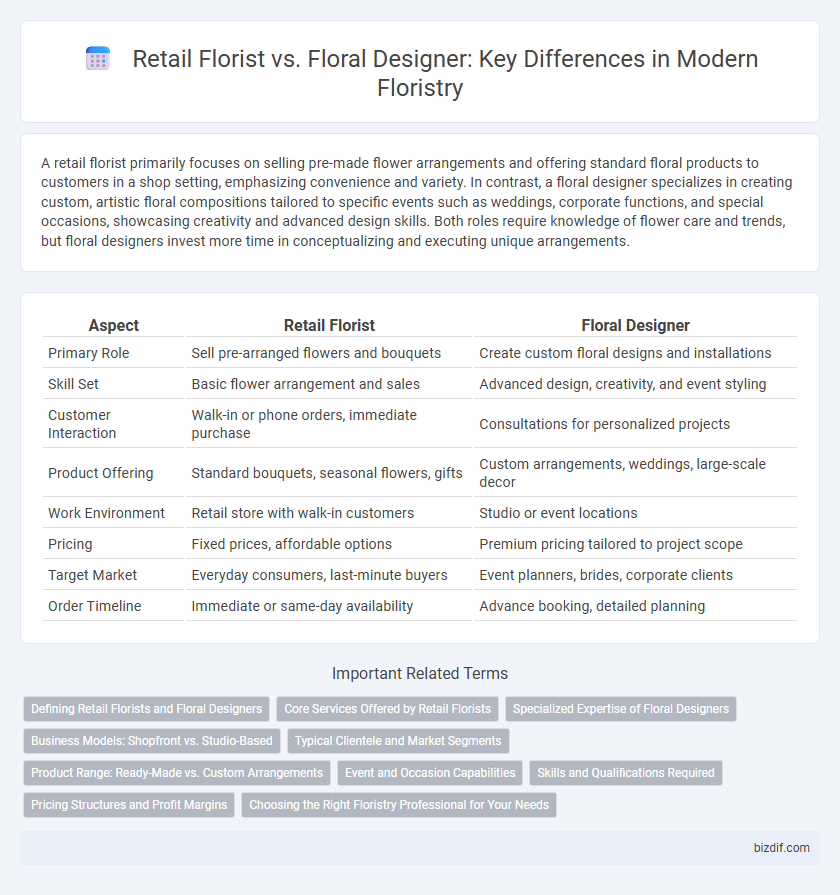A retail florist primarily focuses on selling pre-made flower arrangements and offering standard floral products to customers in a shop setting, emphasizing convenience and variety. In contrast, a floral designer specializes in creating custom, artistic floral compositions tailored to specific events such as weddings, corporate functions, and special occasions, showcasing creativity and advanced design skills. Both roles require knowledge of flower care and trends, but floral designers invest more time in conceptualizing and executing unique arrangements.
Table of Comparison
| Aspect | Retail Florist | Floral Designer |
|---|---|---|
| Primary Role | Sell pre-arranged flowers and bouquets | Create custom floral designs and installations |
| Skill Set | Basic flower arrangement and sales | Advanced design, creativity, and event styling |
| Customer Interaction | Walk-in or phone orders, immediate purchase | Consultations for personalized projects |
| Product Offering | Standard bouquets, seasonal flowers, gifts | Custom arrangements, weddings, large-scale decor |
| Work Environment | Retail store with walk-in customers | Studio or event locations |
| Pricing | Fixed prices, affordable options | Premium pricing tailored to project scope |
| Target Market | Everyday consumers, last-minute buyers | Event planners, brides, corporate clients |
| Order Timeline | Immediate or same-day availability | Advance booking, detailed planning |
Defining Retail Florists and Floral Designers
Retail florists specialize in selling ready-made flower arrangements and plants directly to customers, often managing inventory, customer service, and seasonal promotions in a storefront setting. Floral designers focus on creatively arranging flowers for events, weddings, and custom orders, emphasizing artistry, design principles, and unique compositions tailored to client specifications. The distinction lies in retail florists' emphasis on sales and product availability, while floral designers prioritize innovative floral artistry and personalized design services.
Core Services Offered by Retail Florists
Retail florists specialize primarily in providing ready-made floral arrangements, seasonal flowers, and potted plants for immediate purchase. Their core services include personalized bouquet creation, flower delivery, and event-specific floral setups such as weddings and funerals. Retail florists often offer consultation on flower care and maintenance, ensuring customers receive fresh, high-quality blooms tailored to their preferences.
Specialized Expertise of Floral Designers
Floral designers possess specialized expertise in advanced design techniques, color theory, and flower symbolism, enabling them to create bespoke arrangements tailored to specific events or client visions. Their deep understanding of flower care and structural mechanics ensures the longevity and aesthetic integrity of complex compositions. Unlike retail florists who primarily focus on sales and basic arrangements, floral designers combine artistic innovation with horticultural knowledge to produce unique, high-end floral installations.
Business Models: Shopfront vs. Studio-Based
Retail florists typically operate from shopfront locations, offering walk-in customers convenience, immediate purchase options, and a wide range of ready-made floral arrangements. Floral designers often work from studio-based setups, emphasizing custom, bespoke designs tailored to client specifications, which allows for creative flexibility and appointment-only consultations. The retail florist model prioritizes volume sales and impulse buying, while the studio-based floral designer model focuses on personalized service and high-end event commissions.
Typical Clientele and Market Segments
Retail florists primarily serve everyday customers seeking flowers for personal occasions such as birthdays, anniversaries, and holidays, catering to local walk-in clients and gift buyers. Floral designers typically target higher-end market segments, including weddings, corporate events, and luxury brand collaborations, providing custom and elaborate floral arrangements. Both market segments emphasize quality and creativity, but floral designers often work with event planners and upscale clients requiring bespoke designs.
Product Range: Ready-Made vs. Custom Arrangements
Retail florists typically offer a wide selection of ready-made floral arrangements designed for immediate purchase, catering to common occasions such as birthdays, anniversaries, and holidays. Floral designers specialize in creating custom arrangements tailored to specific client preferences, event themes, and unique design requests, often incorporating exotic or seasonal flowers. The product range of retail florists emphasizes convenience and speed, while floral designers prioritize personalized artistry and bespoke floral solutions.
Event and Occasion Capabilities
Retail florists specialize in creating ready-made floral arrangements for everyday occasions such as birthdays, anniversaries, and holidays, often providing quick service and walk-in availability. Floral designers excel in custom event floral design, crafting bespoke installations for weddings, corporate functions, and large-scale celebrations with a focus on aesthetics, theme coordination, and spatial design. Their expertise includes managing logistics for event timelines, incorporating seasonal blooms, and tailoring arrangements to client vision and venue specifications.
Skills and Qualifications Required
Retail florists require strong customer service skills, knowledge of flower care, and proficiency in arranging standard bouquets, often gained through vocational training or on-the-job experience. Floral designers need advanced artistic ability, expertise in color theory, and familiarity with complex design techniques, typically supported by formal education or certification in floral design. Both roles benefit from creativity and attention to detail, but floral designers demand higher specialization and technical skill sets for elaborate event and wedding arrangements.
Pricing Structures and Profit Margins
Retail florists typically rely on fixed pricing structures based on standardized arrangements, which allow for predictable profit margins but limit customization options. Floral designers often implement variable pricing models tailored to client preferences and event-specific demands, resulting in higher profit margins through premium custom designs. Understanding these distinct pricing strategies helps florists optimize revenue while balancing creativity and cost-efficiency in the floristry market.
Choosing the Right Floristry Professional for Your Needs
Retail florists specialize in providing ready-made flower arrangements and seasonal bouquets suitable for everyday occasions, ensuring convenience and quick service. Floral designers offer customized, artistic creations tailored to specific events such as weddings or corporate functions, showcasing advanced techniques and creative flair. Selecting between a retail florist and a floral designer depends on your need for either immediate floral solutions or personalized, intricate designs.
Retail Florist vs Floral Designer Infographic

 bizdif.com
bizdif.com